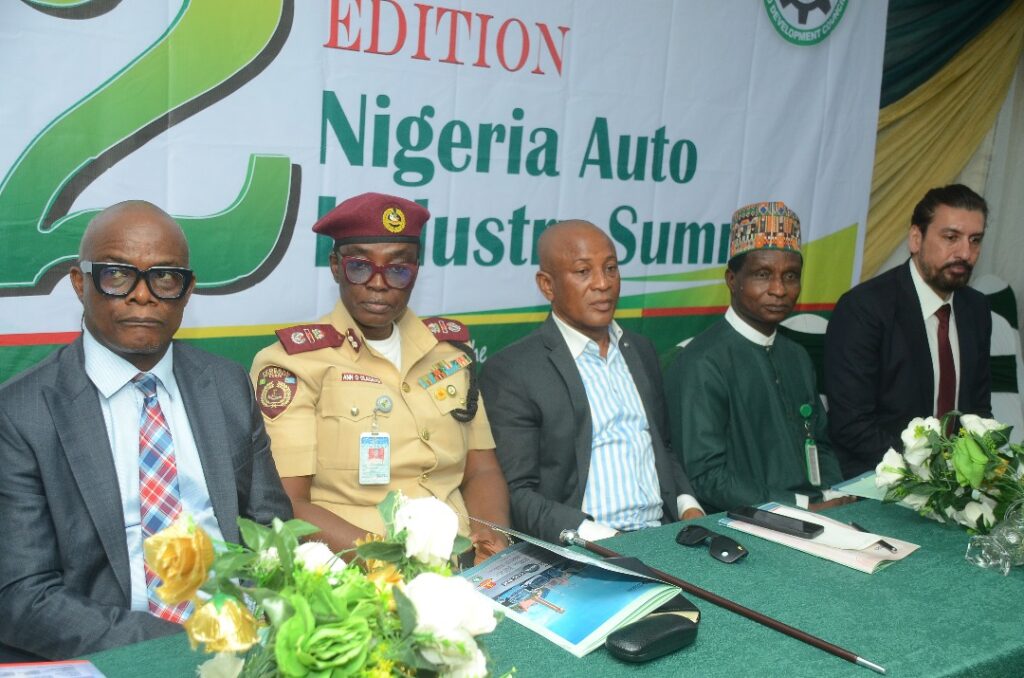
The Chairman of the Nigeria Auto Journalists Association (NAJA), Mr. Theodore Opara, has issued a resounding call for a renewed and strategic push toward the development of local content in the country’s automotive sector.He made this known during his welcome address at the second edition of the Nigeria Auto Industry Summit (NAISU), held under the theme “Nigeria First: Local Content as Catalyst for Automotive Economy.”
The high-profile event, organised by NAJA in collaboration with the National Automotive Design and Development Council (NADDC), brought together top government Executives Industry Stakeholders and policymakers to deliberate on the current state and future trajectory of Nigeria’s Automotive Industry.
In his Opening remarks, Opara welcomed dignitaries including the Minister of State for Industry, Trade & Investment, Senator John Owan Enoh; the Director-General of NADDC, Mr. Joseph Osanipin; the Director-General of the Standards Organisation of Nigeria (SON), Dr. Ifeanyi Chukwunonso Okeke; and the Comptroller General of the Nigeria Customs Service, Mr. Wale Bashir Adeniyi, among others. Reflecting on the significance of the summit, Opara described it as a vital platform for critical stakeholders to engage in robust dialogue and jointly create actionable roadmaps for industrial development.
He noted that the outcomes of the previous summit had been compiled into a communiqué and submitted to relevant government institutions including the Ministry of Industry, the National Assembly, and the Presidency for further action.Speaking on the current state of the industry, the NAJA Chairman bemoaned the sector’s continued overreliance on imports for everything from fully built vehicles to basic auto components like tyres, brake pads, and batteries.
He stressed that Nigeria’s wealth of natural resources, combined with a youthful and dynamic workforce, makes local production not only feasible but necessary.“What we lack is not capability—it is commitment, coordination, and prioritisation of local content development,” he said.He argued that the embrace of local content is not merely a patriotic gesture but a strategic economic necessity, with far-reaching benefits such as job creation, technology transfer, skill development, and foreign exchange savings.
Opara further challenged key industry actors to take decisive action:To NADDC, he applauded recent initiatives such as the electric bus design competition for Nigerian universities but urged the agency to speed up the implementation of the Revised National Automotive Industry Development Plan (NAIDP) and give it legal backing.He also called for enforcement of timelines for SKD to CKD migration and more incentives for investors.
To OEMs and NAMA, he urged a transition from mere vehicle assembly to full-scale manufacturing, emphasising localisation of parts and training of indigenous engineers.To SON and the Nigeria Customs Service, he called for stricter quality enforcement to protect locally-made components and elimination of bureaucratic bottlenecks that hinder access to raw materials.To auto financiers, Opara stressed the need for innovative funding models to support both producers and consumers of locally-manufactured vehicles and parts.To consumers and fleet operators, he issued a direct appeal: “Buy Nigeria. Drive Nigeria. Trust Nigeria.”Reiterating the role of NAJA, Opara affirmed that auto journalists are not just reporters but partners in development—acting as advocates, watchdogs, and conveyors of industry progress.
He emphasised NAJA’s continued commitment to accountability and engagement through its three flagship initiatives: the Nigeria Auto Industry Summit (NAISU), the NAJA Training Workshop, and the annual NAJA Awards.He concluded with a powerful charge: “If Nigeria must industrialize, the auto sector must lead. If the auto sector must thrive, local content must be the engine. Let us not leave this summit with just communiqués and handshakes. Let us leave with commitments, partnerships, and a shared resolve to make ‘Nigeria First’ not just a slogan—but a strategy for economic transformation.”
